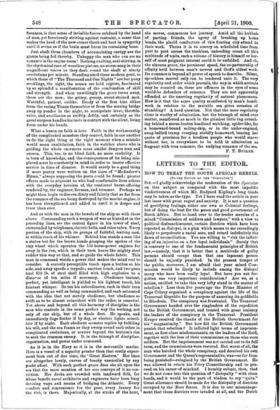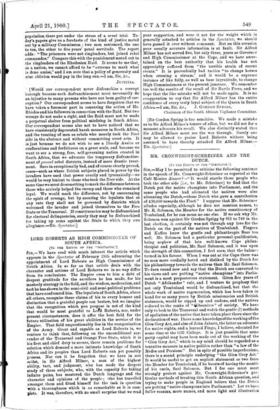LETTERS TO THE EDITOR.
HOW TO TREAT THE SOUTH AFRICAN REBELS.
[To THE EDITOR OF THE "SPECTATOR."] SIR,—I gladly acknowledge the moderation of the Spectator on this subject as compared with the most impolitic vindictiveness of which Mr. Rudyard Kipling's long tirade may be taken as the type. Yet I have read the article in your last issue with great regret and anxiety. It is not a question of gratifying feelings, either our own or Colonial feelings, but of doing the best for the peace and good government of South Africa. But to hand over to the tender mercies of a mixed "Commission of soldiers and lawyers," with a view to political disfranchisement, certain districts which have been reported as disloyal, is a plan which seems to me exceedingly likely to perpetuate a racial sore, and retard indefinitely the dawn of reconciliation. You are willing to "risk the inflict- ing of an injustice on a few loyal individuals." Surely that is contrary to one of the fundamental principles of British law,—namely, that it is better that a multitude of guilty persons should escape than that one innocent person should be unjustly punished. In the present temper of the public, moreover, I am afraid that your mixed Com- mission would be likely to include among the disloyal many who have been really loyal. But have you not for- gotten one very important consideration ? Are we, as a nation, entitled to take this very lofty stand in the matter of rebellion Lees than five years ago the Prime Minister of Cape Colony organised a conspiracy against the life of the Transvaal Republic for the purpose of annexing its goldfields to Rhodesia. The conspiracy was frustrated. The Transvaal Government handed over the ringleaders of the expedition to the British Government, and treated with great leniency the leaders of the conspiracy in the Transvaal. President Kruger received the thanks of the British Government for his "magnanimity." But how did the British Government punish that rebellion ? It inflicted light terms of imprison- ment, as first-class misdemeanants, on the leaders of the Raid, together with the loss of their commissions on those who were soldiers. But the imprisonment was not carried out to its full term, and the commissions were restored. But, worst of all, the man who hatched the whole conspiracy, and deceived his own Government and the Queen's representative, was—so far from being punished—eulogised by the British Government. He was allowed to retain his Privy Councillorship and to pro- ceed on his career of mischief. I humbly submit, then, that we do not come into this question of "disloyalty " with clean hands, and it would be the part of wisdom to cry "quits." Great allowance should be made for the disloyalty of districts occupied by the Boer forces. It is due to oar mismanage- ment that those districts were invaded at all, and the Dutch
population there put under the stress of a cruel trial. To- day's papers give us a foretaste of the kind of justice meted out by a military Commission ; two men sentenced, the one to ten, the other to five years' penal servitude. The report adds : "The prisoners were not ringleaders, but joined rebel commandos." Compare this with the punishment meted out to the ringleaders of the Rhodesian Raid. It seems to me that as a nation, we cannot afford to be "extreme to mark what is done amiss," and I am sure that a policy of generosity and wise oblivion would pay in the long run.—I am, Sir, &c., JUSTITIA.
[Would our correspondent never disfranchise a corrupt borough because such disfranchisement must necessarily do an injustice to many persons who have not been guilty of cor- ruption? Our correspondent seems to have forgotten that we have taken a foremost part in censuring the action of Mr. Rhbdes and his followers in connection with the Raid. But two wrongs do not make a right, and the Raid must not be made a perpetual shelter from political misdoing in South Africa. Our correspondent seems also not to have noticed that we have consistently deprecated harsh measures in South Africa, and the treating of men as rebels who merely took the Boer side in the abstract and without committing overt acts. It is just because we do not wish to see a Bloody Assize or confiscations and forfeitures on a great scale, and because we want to see a strong, free, self-governing nation created in South Africa, that we advocate the temporary disfranchise- ment of proved rebel districts, instead of more drastic treat- ment. Save in exceptionally bad, and of course clearly proved, eases—such as where British subjects placed in power by the invaders have used that power cruelly and tyrannically—we would be very lenient to those who took the Boer side. At the same time we must do something to mark the difference between those who actively helped the enemy and those who remained loyal. We would mark the difference, not by encouraging the spirit of revenge, but by assuring the loyalists that at any rate they shall not be governed by districts which welcomed the invader and joined themselves to the Free State or the Transvaal. If constituencies may be disfranchised for electoral delinquencies, surely they may be disfranchised for taking up arms against the State to which they owe allegiance.—ED. Spectator.]



































 Previous page
Previous page